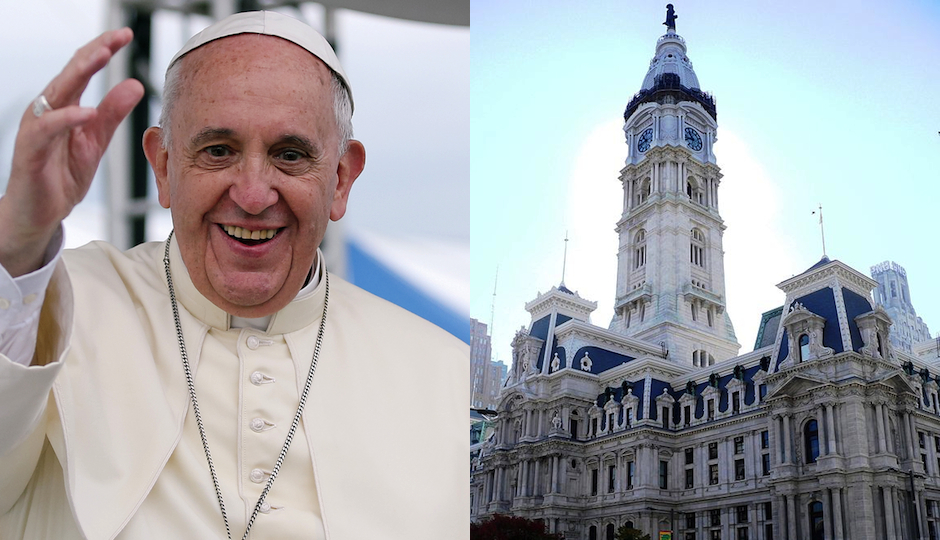Philly Pope Visit: Letter Warns Mayor Nutter About Separation of Church, State
The City of Philadelphia is obviously spending a lot of time, money and aggravation on pulling off the Pope Francis visit for the World Meeting of Families next weekend. But could some of that work violate the United States Constitution?
The Washington D.C.-based organization Americans United for Separation of Church and State has sent a letter (below) to Philadelphia Mayor Michael Nutter and SEPTA Chairman Pasquale Deon, warning them of running afoul of the law. This is the same organization that threatened Cape May with legal action for its role in a papal livestreaming event; Cape May has since pulled out of that function.
“We have received numerous inquiries expressing concerns about the elaborate preparations for — and potential cost to taxpayers of — Pope Francis’s visit to the United States,” wrote Americans United associate legal director Alex Luchenitser in a letter also addressed to the mayors of New York and Washington D.C. and to the directors of the Secret Service and the National Park Service. “Government bodies must not provide any aid to a Pope’s religious activities that goes beyond the provision of services — such as police, safety and security — that are regularly given for comparable public events of a similar size.”
Luchenitser gives several examples of measures that the organization suggests are extraordinary, including the so-called “traffic box,” the closure of a large number of city streets, the suspension or limitation of many city services, and SEPTA’s decision to not honor the standard TransPass.
The letter cites various legal precedents and offers its interpretation of them. Bottom line, according to Americans United: Philadelphia cannot take “any action that communicates a message of endorsement of religion”; the city must preserve “neutrality … between religion and non-religion”; and there cannot be “public aid for religious activity, such as worship or religious instruction.”
One of those legal cases is actually from Pope John Paul II‘s 1979 visit to Philadelphia. The city spent taxpayer money on stages, chairs, a sound system and floral decorations for the papal mass, and good old Mayor Frank Rizzo, whom one could always count on to enflame a situation, declared, “I will build a church for my pope.”
A lawsuit ensued, and eventually the Third Circuit Court of Appeals ruled that the city violated the Establishment Clause of the Constitution. (It should be noted that there is a growing movement in the United States that claims that the concept of “separation of church and state” does not actually exist in the Constitution, promoted by people like Rush Limbaugh and Michelle Bachmann. We disagree, as does the Supreme Court.)
The pope’s visit is different than would be the visit of another major world religious leader — say, Billy Graham or the late Sun Myung Moon — because in addition to being the head of the Catholic Church, Pope Francis is also considered a head of state, as he is the sovereign of Vatican City. And so, Philadelphia can realistically provide the same services to him that it might provide to another visiting head of state.
Luchenitser says it was easier to go after Cape May, because the town wasn’t dealing with the logistical issues of hosting a visiting head of state. “They just decided to sponsor the livestreaming of a papal mass,” he observes.
When we asked City Hall for a comment on the warning from Americans United, spokesman Mark McDonald insisted that the costs of the event are being paid for by the World Meeting of Families. Still, Americans United has filed right-to-know requests with the city for the relevant records just to be sure, and it is likely that no one will know if the city spent any taxpayer money until after Pope Francis is long gone.
But Luchenitser admits that there is a lot of gray area surrounding the pope’s visit.
“What makes this hard to analyze legally, in terms of what the city is doing, is that we’re not aware of any other time someone else came to Philadelphia and drew these crowds,” he tells us. “This seems to be unprecedented. But we are monitoring the plans, and we are concerned by the church-state issues raised by the city’s high level of involvement in the visit.”
Follow @VictorFiorillo on Twitter.



